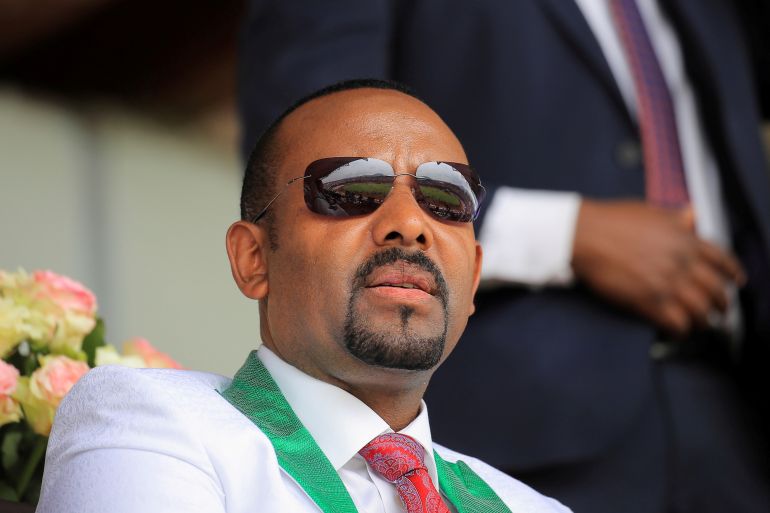Ethiopia declares unilateral truce to allow aid into Tigray
Ethiopia said it was declaring ‘an indefinite humanitarian truce effective immediately’.

Ethiopia’s government has declared “an indefinite humanitarian truce effective immediately”, saying it hoped to help hasten delivery of emergency aid into the Tigray region, where hundreds of thousands face starvation.
Since war broke out in northern Ethiopia in November 2020, thousands have died, and millions remain displaced as the conflict has expanded from Tigray to the neighbouring regions of Amhara and Afar.
Keep reading
list of 3 itemsEthiopia’s new ‘national dialogue’ cannot deliver inclusive peace
Ethiopia’s new national dialogue can unify the divided nation
Prime Minister Abiy Ahmed’s government “is committed to exert maximum effort to facilitate the free flow of emergency humanitarian aid into the Tigray region,” it said in a statement on Thursday.
“To optimise the success of the humanitarian truce, the government calls upon the insurgents in Tigray to desist from all acts of further aggression and withdraw from areas they have occupied in neighbouring regions,” it said.
“The government of Ethiopia hopes that this truce will substantially improve the humanitarian situation on the ground and pave the way for the resolution of the conflict in northern Ethiopia without further bloodshed.”
A spokesman for the Tigrayan forces did not respond to a request for comment on the announcement, which followed a visit by the US special envoy for the Horn of Africa, David Satterfield, to the capital Addis Ababa this week.
The conflict erupted when Abiy sent troops into Tigray to topple the Tigray People’s Liberation Front (TPLF), the region’s former governing party, saying the move came in response to rebel attacks on army camps.
Fighting has dragged on for more than a year, triggering a humanitarian crisis, as accounts have emerged of mass rapes and massacres, with both sides accused of human rights violations.
Government spokesperson Legesse Tulu told the Reuters news agency the truce was unilateral.
“This is just a government decision to protect our citizens from danger,” he said. “We hope the other side [TPLF] will do the same.”
More than 400,000 people have been displaced in the war-ravaged northern province of Tigray, according to the United Nations.
The region has also been subject to what the UN has said is a de facto blockade.
The UN’s humanitarian arm OCHA said no trucks have made it into Tigray since December 15, citing administrative as well as security constraints. OCHA said the aid effort is hampered by a lack of funds, supplies and partners.
The United States has accused Abiy’s government of preventing aid from reaching those in need, while the authorities in turn have blamed the rebels for the obstruction.
Nearly 40 percent of the people in Tigray, a region of six million people, face “an extreme lack of food”, the UN said in January, with fuel shortages forcing aid workers to deliver medicines and other crucial supplies by foot.
‘Welcome news’
Western nations have been urging both sides to agree to a ceasefire, with the UK and Canada hailing the truce declaration.
“The UK welcomes the Government of Ethiopia’s decision to announce an indefinite humanitarian truce, and to ensure unimpeded access of aid into Tigray. We call on Tigrayan authorities to reciprocate,” the British embassy in Ethiopia said on Twitter.
Canada’s embassy to Ethiopia and Djibouti said on Twitter that the announcement was “welcome news, as aid is urgently needed in northern Ethiopia”.
Stephane Dujarric, the spokesman for UN Secretary-General Antonio Guterres, also told reporters on Thursday that Guterres “hopes that this truce will translate into an effective cessation of hostilities, respected by all parties in this conflict, to allow for effective humanitarian access for all who need it”.
Diplomats led by Olusegun Obasanjo, the African Union’s special envoy for the Horn of Africa, have been trying for months to broker peace talks, with little evident progress so far.
Analysts said the truce was an important step but urged the government to follow up the announcement with action and ease humanitarian access to Tigray.
“The unconditional and unrestricted delivery of aid could also help create enough trust to pave the way for ceasefire talks and, eventually, dialogue,” William Davison, the International Crisis Group’s senior analyst for Ethiopia, told the AFP news agency.
More than nine million people need food aid across Afar, Amhara and Tigray, according to the UN’s World Food Programme.
“WFP operations in the Tigray region have ground to a halt, with only emergency fuel stocks and less than one percent of the required food stocks remaining,” the agency said this week.
A TPLF push into Afar has worsened the situation, driving up the need for emergency aid in the region.
The road from Afar’s capital, Semera, to Tigray’s capital Mekelle is the only operational land route into Tigray, where the UN has estimated hundreds of thousands are living in famine-like conditions.
The government previously declared a “unilateral ceasefire” in Tigray in June last year, after the TPLF mounted a shock comeback and retook the region from federal forces.
But fighting intensified in the second half of 2021, with the rebels at one point claiming to be within 200km (125 miles) of the capital Addis Ababa, before reaching a deadlock.
Ethiopian troops and allied soldiers from neighbouring Eritrea have committed a litany of abuses including torture, weaponised rape and targeted killings of Tigrayans, according to human rights groups.
Rebel fighters loyal to the TPLF have also been accused of similar abuses.